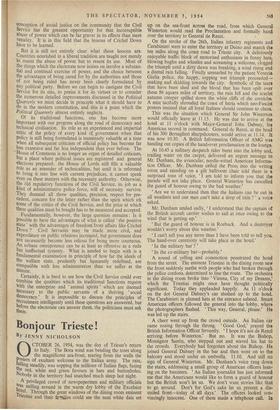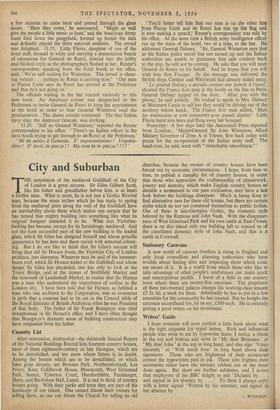Bonjour Trieste!
B Y JENNY NICHOLSON 0 CTOBER 26, 1954, was the day of Trieste's return to Italy. The Bora wind was bending the trees along the magnificent sea-front, tearing from the walls the rPsters of exultant welcome to the Italian army. The rain, hng steadily, was sopping the millions of Italian flags, fusing tile red, white and green favours in hats and buttonholes. Nobody in the territory had snatched much sleep last night.
A privileged crowd of newspapermen and military officials was milling around in the warm dry lobby of the Excelsior hotel.. Through the great windows of the dining room eminent Triestini and their fenilies could see the neat white dais set up on the sea-front across the road, from which General Winterton would read the Proclamation and formally hand over the territory to General de Renzi.
On the stroke of the 26th. Italian infantry regiments and Carabinieri were to enter the territory at Duino and march the ten miles along the coast road to Trieste city. A deliriously enjoyable traffic block of motorised enthusiasts in funny hats, blowing bugles and whistles and screaming a welcome, clogged the triumph until a dirty dawn was breaking, a wind rising and a dismal rain falling. Finally unsnarled by the patient Venezia Giulia police, the happy, sopping wet triumph proceeded— snaking and skidding towards the city. Symbolic of the tears that have been shed and the blood that has been spilt over these 86 square miles of territory, the rain fell and the scarlet autumn creeper spilled down the white cliffs of the corniche. A mist tactfully shrouded the coast of Istria which neo-Fascist posters insisted that all loyal Italians should 'continue to claim.
This was the situation which General Sir John Winterton would officially leave at 11.15. He was due to arrive at the hotel at 11 o'clock with Major-General John Dabney, his American second in command. General de Renzi, at the head of his 300 Bersaglieri sharpshooters, would arrive at 11.14. It was now 10.30. A British Information Officer of AMG was handing out copies of the hand-over proclamation in the lounge.
At 10.45 a military despatch rider burst into the lobby and, trailing water on the carpet, delivered an urgent message to Mr. Dunham, the avuncular, needle-witted American Informa- tion Officer. Mr. Dunham called the Press into the writing room and standing on a gilt ballroom chair told them in a surprised tone of voice, 'I am told to inform you that the parade will not take place. General Winterton has cancelled the guard of honour owing to the bad weather.'
'Are we to understand then that the Italians can be out in all weathers and our men can't take a drop of rain ? ' a voice asked.
Mr. Dunham smiled sadly, 'I understand that the captain of the British aircraft carrier wishes to sail at once owing to the wind that is getting up.' But the guard of honour is in Roebuck. And a destroyer wouldn't worry about this weather.'
'I can't tell you any more than I have been told to tell you. The hand-over ceremony will take place in the hotel.'
In the military bar ? '
In the ex-military bar—probably.'
A sound of yelling and commotion penetrated the hotel from the street. The eminent Triestini in the dining room saw the front suddenly seethe with people who had broken through the police cordons. determined to line the route. The orchestra in the dining room broke into 'Vienna, City of my Dreams,' which the Triestini might once have thought politically significant. Today they applauded happily. At 11 o'clock on the dot General Dabney's car slushed up to the hotel. The Carabinieri in plumed hats at the entrance saluted. Smart American officers followed the general into the lobby, where the photographers flashed. This way, General, please.' He was led up the stairs.
A cheer went up from the crowd outside. An Italian car came nosing through the throng. 'Good God,' prayed the British Information Officer fervently. I hope it's not de Renzi arriving before Winterton.' But no. It was the Bishop. Monsignor Santin, who stepped out and waved his hat to the crowds. Everybody had forgotten about the Bishop. Ho joined General Dabney in the bar and then went on to the balcony and stood under an umbrella. 11.10. And still no sign of General, Winterton. Mr. Dunham's voice rang down the stairs, addressing a small group of American officers lean- ing on the banisters. 'An Italian journalist has just informed me that the Americans would like to form a guard of honour but the British won't let us. We don't want stories like that to go around. Don't for God's sake let us present a dis- united front—today of all days.' The officers looked con- vincingly innocent. One of them made a telephone call. in a few minutes he came back and peered through the glass doors. 'Here they come,' he announced. Might as well give the people a little music at least,' and the American Army band filed down the gangplank, formed up beside the dais and defiantly played the three national anthems. The crowd was delighted. 11.15. Little Flavia, daughter of one of the hotel staff, dressed in white and carrying a presentation bunch of carnations for General de Renzi, minced into the lobby and blinked coyly as the photographers flashed at her. Reuter's correspondent, speaking from the hotel booth to his office, said, We're still waiting for Winterton. The crowd is cheer- ing outside . . . perhaps de Renzi is arriving now." Our man in Piazza Unita says de Renzi has arrived at the Prefettura and that he's not going on.'
The officials waiting in the bar reacted variously to this new twist. An American runner was despatched to the Prefettura to invite General de Renzi to keep his appointment at the hotel in order to hear General Winterton read the proclamation. The cheers outside continued. The first Italian navy ship, the destroyer Grecale, was docking.
11.20. Still no General Winterton,' reported the Reuter correspondent to his office. There's an Italian officer in the next booth trying to get through to de Renzi at the Prefettura.'
Mi da subito il Generale. E' itnportantissimo ! Urgentis- simo I E' fuori, in piazza ! ! Ma cosa fa in piazza ? ! ! I ' • You'd better tell him that our man is on the other line from Piazza Unita and de Renzi has run up the flag and is now making a speech,' Renter's correspondent was told by his office. At the same time a British army intelligence officer ran up the stairs of the hotel, two at a time, to the bar. He addressed General Dabney. Sir, General Winterton says that as the Italian police escort has not turned up and the Italian authorities are unable to guarantee him safe conduct back to the ship, he will not be coming. He asks that you will meet General de Renzi on his behalf. And he hopes that you will wish him Bon Voyage. As the message was delivered the British ships Centaur and Whirlwind had already sailed away.
Le general Dabney a attendu comme tine fiancee a l'autel,' shouted the France Soir man in the booth on the line to Paris. General Dabney tapped on the door. After you with the phone,' he said politely. He wished to speak to Mrs. Dabney at Miramare Castle to tell her they would be driving out of the territory before lunch. The France Soir man added, ' Mais les A mericains se sont comportes avec grande dignite.' Little Flavia burst into tears and flung away her bouquet. Postscript: A few days later the Associated Press reported from London: MajorLiGeneral Sir John Winterton, Allied Military Governor of Zone A of Trieste, flew back today with praise for the co-operation of the Italian army staff. The hand-over, he said, went with "remarkable smoothness."'



































































 Previous page
Previous page